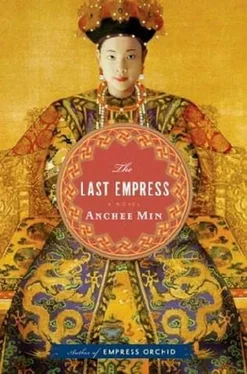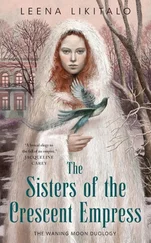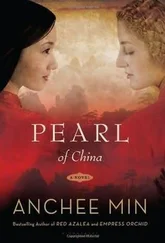An-te-hai sent Li Lien-ying, who was now his most trusted disciple, to give me a head massage. With a good rubbing I felt the tension in my body dissolve like clay in water. I looked at myself in the mirror and saw that wrinkles had crept onto my smooth forehead. My eyes had bags beneath them. While my features retained their beauty, their youthful glow had disappeared.
I did not tell An-te-hai about my conversation with Tung Chih, yet he sensed it. He sent Li Lien-ying to guard me at night and moved his sleeping mat out of my room. Years later, I would find out that my eunuch had been threatened by my son. An-te-hai was to either stay away or be removed-meaning murdered. As if to make sure that no eunuch developed a close relationship with me, An-te-hai rotated my room attendants. It took me a while to realize his intention.
Among all my attendants, I adored Li Lien-ying, who had served me since he was a young boy. He was sweet-tempered and as capable as An-te-hai, though I couldn't talk with him as I had with An-te-hai. As masters of serving another, Li Lien-ying was a craftsman, but An-te-hai was an artist. For example, An-te-hai had been devising a way to get Yung Lu into my inner garden for some time. He had arranged for bridge and roof repairs around my palace, so outside workers would have to be brought in, and with them Imperial Guards. An-te-hai believed that this would give Yung Lu a chance to supervise. The plan hadn't worked, but An-te-hai had continued his effort.
Li Lien-ying was a much more popular eunuch than An-te-hai. He had a talent for making friends, a skill An-te-hai lacked. Servants never knew when An-te-hai would show up to inspect their work. And if he was dissatisfied, he would make a scene, try to "educate" them.
A rumor began to circulate among the servants that An-te-hai would soon be replaced as chief eunuch by Li Lien-ying. An-te-hai became furiously jealous and suspected that Li had stolen my affection. One day An-te-hai found an excuse to interrogate Li. When Li protested, An-te-hai charged him with being disrespectful and ordered him whipped.
To show fairness, I had An-te-hai whipped and withheld his food for three days and confined him to the eunuchs' quarters. A week later I went to see him. He was sitting in his small yard examining his bruises. When I asked what he had done during his confinement, he showed me something he had built from scraps of wood and bits of rag.
I was in awe of what I saw. "A little dragon boat!" It was a miniature ship, modeled after one of Cheng Ho's fleet. It was no bigger than An-te-hai's arm but was intricately detailed, with sails, rigging, and tiny cargo crates.
"Someday I'd like to travel south to see Cheng Ho's burial site in Nanking," An-te-hai said. "I will make an offering and ask his spirit to accept me as a distant disciple."
The late summer of 1869 was hot and humid. I had to change my inner shirt twice a day. If I didn't, sweat would make the dye run on my court robe. Since the Forbidden City had few trees, there was no escape from the heat. The sun baked the stone paths. Every time eunuchs poured water on the ground, we could hear a hissing sound and see white steam.
The court tried to cut audiences short. Blocks of ice were brought in, and carpenters devised makeshift box chairs to hold the blocks. The summoned, who wore heavy court robes, would sit right on top of the ice. By noon, puddles of water would spread out from beneath the boxes. It looked as if the ministers had urinated.
Nuharoo wore a moss-colored dress when she entered the Hall of Spiritual Nurturing during a break in the audience. The eunuchs began to work the wooden fans to draw wind. Nuharoo frowned because the fans made a terrible noise, like the slamming of windows and doors.
She sat down elegantly on a chair opposite me. We glanced at each other's dresses, makeup and hair while exchanging greetings. I hated wearing makeup in the summer and applied it only lightly. I sipped tea and made an effort to appear interested. By now I knew Nuharoo well enough to predict that any proposal of hers would have nothing to do with the nation's urgencies. I had made many attempts in the past to brief her on court business. She would either change the subject or simply ignore me.
"Since you have to go back to the audience, I shall be brief." Smiling, Nuharoo took a sip of her tea. "I have been thinking how the dead like to hear the living cry on the day their spirits return home. How do we know that our husband does not desire the same?"
I did not know what to make of her words, so I muttered something about how the pile of court documents on my table was growing higher and higher.
"Why can't we create a picture of Heaven to welcome the spirits?" Nuharoo said. "We could dress the maids up in the costumes of moon goddesses and scatter them around in decorated boats on Kun Ming Lake. Eunuchs could hide in the hills and behind pavilions and play flutes and string instruments. Wouldn't Hsien Feng like that?"
"I am afraid it would be expensive," I said flatly.
"I knew you would say that!" She pouted. "Prince Kung must be responsible for putting you in such an unpleasant mood. Anyway, I have already ordered the party. Whether or not the court has the taels, the minister of revenue is responsible for paying for the Emperor's memorial. This is a small gesture."
Between audiences, I took time to take care of things that Prince Kung thought were unimportant. For example, an article came to my attention. It was published in The Court's Updates, a newspaper read by many government officials. It reprinted the essay of the top winner of that year's civil service examination, called "The Ruler Who Surpasses China's First Emperor."
The author flattered my son beyond belief. The choice of title was alarming. It told me that something unhealthy was developing in the heart of our government.
I asked for the list of examination winners from the judges. When it was delivered, I circled the author's name with a red brush pen. I removed him from first place and sent the list back.
It wasn't that I didn't enjoy flattery. Then again, I could distinguish between puffery and praise that was earned. But people tended to accept newspaper articles at face value. What I was afraid of was that if I failed to stop the tendency toward flattery, my son's regime would end up losing its valuable critics.
"I have not heard the whistling of the pigeons. What has become of them?" I asked An-te-hai.
"The pigeons are gone," the eunuch replied. Although his movements were still stylish and his gestures elegant, An-te-hai looked nervous and his large eyes had lost their brightness. "They must have decided to find a more genial home."
"Was it because you neglected them?"
An-te-hai was silent. Then he bowed. "I let them go, my lady."
"Why?"
"Because the cages don't suit them."
"Their cages are grand! The royal pigeon house is as big as a temple! How much bigger would the pigeons want? If you think they need more space, ask the carpenters to enlarge the cages. You can make them two stories high if you want. Make twenty cages, forty cages, a hundred cages!"
"It is not the size, my lady, nor the number of cages."
"What is it, then?"
"It's the cage itself."
"It never bothered you before."
"It does now."
"Nonsense."
The eunuch lowered his head. After a while he uttered, "It is painful to be locked up."
"Pigeons are animals, An-te-hai! Your imagination has become addled."
"Perhaps. But it is the same imagination that finds fault with the assumption of happiness and glory in your life, my lady. The good thing is that pigeons are unlike parrots. Pigeons can fly away, while parrots are chained. Parrots are forced to serve, to please by mimicking human words. My lady, we have also lost our parrot."
Читать дальше












